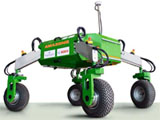Agricultural and Biological Systems Engineering, Department of

Department of Agricultural and Biological Systems Engineering: Faculty Publications
Document Type
Article
Date of this Version
2013
Citation
Jia et al. Journal of Biological Engineering 2013, 7:1.
Abstract
Background: Sweet sorghum is a domesticated grass containing a sugar-rich juice that can be readily utilized for ethanol production. Most of the sugar is stored inside the cells of the stalk tissue and can be difficult to release, a necessary step before conventional fermentation. While this crop holds much promise as an arid land sugar source for biofuel production, a number of challenges must be overcome. One lies in the inherent labile nature of the sugars in the stalks leading to a short usable storage time. Also, collection of sugars from the sweet sorghum stalks is usually accomplished by mechanical squeezing, but generally does not collect all of the available sugars.
Results: In this paper, we present two methods that address these challenges for utilization of sweet sorghum for biofuel production. The first method demonstrates a means to store sweet sorghum stalks in the field under semi-arid conditions. The second provides an efficient water extraction method that can collect as much of the available sugar as feasible. Operating parameters investigated include temperature, stalk size, and solid–liquid ratio that impact both the rate of sugar release and the maximal amount recovered with a goal of low water use. The most desirable conditions include 30°C, 0.6 ratio of solid to liquid (w/w), which collects 90 % of the available sugar. Variations in extraction methods did not alter the efficiency of the eventual ethanol fermentation.
Conclusions: The water extraction method has the potential to be used for sugar extraction from both fresh sweet sorghum stalks and dried ones. When combined with current sugar extraction methods, the overall ethanol production efficiency would increase compared to current field practices.


Comments
Copyright 2013 Jia et al.; licensee BioMed Central Ltd. This is an Open Access article distributed under the terms of the Creative Commons Attribution License